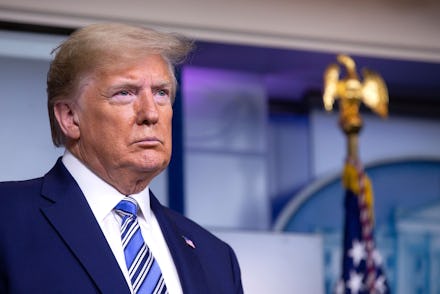Trump implies, without evidence, that mosques are getting away with skirting social distancing laws

Throughout the coronavirus pandemic, President Trump has made a number of claims without evidence to back them. Who can forget his now infamous "cure"? Over the weekend, Trump targeted Muslims by claiming mosques could get special treatment during Ramadan. His comments may incite additional Islamophobia during one of Islam's holiest months.
This year, Ramadan takes place from April 23 to May 23. Muslims who are able to do so spend the month fasting from pre-dawn to sunset and, in normal circumstances, would attend nightly taraweeh prayers at the mosque. Although Ramadan celebrations are often communal, Muslims are preparing for changes under lockdown.
Nevertheless, on Saturday, Trump retweeted conservative author Paul Sperry, who wrote, "Let's see if authorities enforce the social distancing order for mosques during Ramadan (April 23-May 23) like they did churches during Easter."
Later that day, a reporter at the White House coronavirus task force briefing asked Trump why he shared that tweet. Trump replied, "You know, I just spoke with leaders and people that love mosques. They love mosques! And I'm all in favor of that. But I would say that there could be a difference. And we'll have to see what will happen. Because I have seen a great disparity in this country."
He continued: "They go after Christian churches but they don't tend to go after mosques. And I don't want them to go after mosques! But I do want to see what their event is," Trump added. He didn't offer further details as to what he was talking about, leaving reporters to parse his vague and contradictory sentences.
Nor is it clear whom Trump was referring to with his repeated reference to "they." Regardless, Trump provided no evidence for his claim that he has "seen a great disparity in this country." On the contrary, the lengthy history of American surveillance of Muslims would suggest that authorities already target mosques more than churches.
While Trump seems to be attempting to use Muslims as a scapegoat — for what, though, it's unclear — Muslims themselves are preparing for massive changes this Ramadan. The Fiqh Council of North America, a body of scholars from the United States and Canada, stated that "[mosques] and Islamic centers shall strictly follow the health and state official guidelines for social gatherings and distancing."
A number of community-led organizations have coordinated digital Ramadan efforts. For example, Believers Bail Out launched its Reimagining Community 2020 (Virtual) Ramadan Calendar, and Black Iftar shared that it will "use various digital tools to replace large, in-person gatherings deemed unsafe by the CDC due to COVID-19."
This is not the first time Trump has amplified Islamophobia on Twitter. Last April, Trump joined in on harassment of Democratic Rep. Ilhan Omar (Minn.) by tweeting a video of one of her speeches intercut with footage from 9/11. He later came came under fire after one of his supporters was arrested for threatening to Omar.
Overall, Trump's comments are part of larger trend of Islamophobia creeping into coronavirus rhetoric. And the president's contributions extend past social media and the current crisis. The Muslim-led MPower Change collected a list of dozens of incidents in which the president appeared to traffic in anti-Muslim sentiment, while his policy moves like the 2017 travel ban and his later ban specifically targeting Africans have disproportionately affected Muslims.